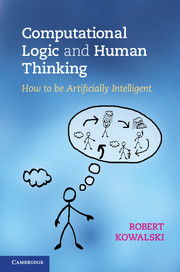Book contents
- Frontmatter
- Contents
- Preface
- Summary and plan of the book
- Introduction
- 1 Logic on the Underground
- 2 The psychology of logic
- 3 The fox and the crow
- 4 Search
- 5 Negation as failure
- 6 How to become a British Citizen
- 7 The louse and the Mars explorer
- 8 Maintenance goals as the driving force of life
- 9 The meaning of life
- 10 Abduction
- 11 The Prisoner’s Dilemma
- 12 Motivations matter
- 13 The changing world
- 14 Logic and objects
- 15 Biconditionals
- 16 Computational Logic and the selection task
- 17 Meta-logic
- Conclusions of the book
- A1 The syntax of logical form
- A2 Truth
- A3 Forward and backward reasoning
- A4 Minimal models and negation
- A5 The resolution rule
- A6 The logic of abductive logic programming
- References
- Index
Introduction
Published online by Cambridge University Press: 07 September 2011
- Frontmatter
- Contents
- Preface
- Summary and plan of the book
- Introduction
- 1 Logic on the Underground
- 2 The psychology of logic
- 3 The fox and the crow
- 4 Search
- 5 Negation as failure
- 6 How to become a British Citizen
- 7 The louse and the Mars explorer
- 8 Maintenance goals as the driving force of life
- 9 The meaning of life
- 10 Abduction
- 11 The Prisoner’s Dilemma
- 12 Motivations matter
- 13 The changing world
- 14 Logic and objects
- 15 Biconditionals
- 16 Computational Logic and the selection task
- 17 Meta-logic
- Conclusions of the book
- A1 The syntax of logical form
- A2 Truth
- A3 Forward and backward reasoning
- A4 Minimal models and negation
- A5 The resolution rule
- A6 The logic of abductive logic programming
- References
- Index
Summary
Computational Logic has been developed in Artificial Intelligence over the past 50 years or so, in an attempt to program computers to display human levels of intelligence. It is based on Symbolic Logic, in which sentences are represented by symbols and reasoning is performed by manipulating symbols, like solving equations in algebra. However, attempts to use Symbolic Logic to solve practical problems by means of computers have led to many simplifications and enhancements. The resulting Computational Logic is not only more powerful for use by computers, but also more useful for the original purpose of logic, to improve human thinking.
Traditional Logic, Symbolic Logic and Computational Logic are all concerned with the abstract form of sentences and how their form affects the correctness of arguments. Although Traditional Logic goes back to Aristotle in the fourth century b.c., Symbolic Logic began primarily in the nineteenth century, with the mathematical forms of logic developed by George Boole and Gottlob Frege. It was enhanced considerably in the twentieth century by the work of Bertrand Russell, Alfred North Whitehead, Kurt Gödel and many others on its application to the Foundations of Mathematics. Computational Logic emerged in the latter half of the twentieth century, starting with attempts to mechanise the generation of proofs in mathematics, and was extended both to represent more general kinds of knowledge and to perform more general kinds of problem solving. The variety of Computational Logic presented in this book owes much to the contributions of John McCarthy and John Alan Robinson.
- Type
- Chapter
- Information
- Computational Logic and Human ThinkingHow to Be Artificially Intelligent, pp. 1 - 8Publisher: Cambridge University PressPrint publication year: 2011



